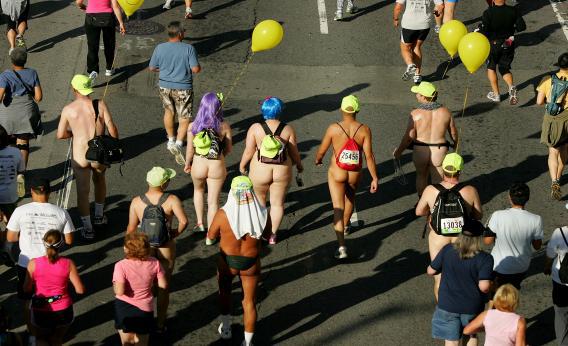On Tuesday, my Slate colleague William Saletan wrote a piece about the gay and lesbian support for an ordinance restricting public nudity in San Francisco. What makes this newsworthy, presumably, is that while homosexuals are supposed to be renders of the fabric of society, in this case, they—especially the gay-married ones—are acting downright wholesome! As Saletan so quotably puts it, “the rise of same-sex households isn’t making society queer. It’s making gay people bourgeois.”
Before we get into Saletan’s argument, here’s a quick recap for those who haven’t been following the story: In response to an alleged increase in “aggressive” nudity (mostly male) in the traditionally queer Castro neighborhood, Supervisor Scott Wiener, at the behest of some concerned residents, convinced the Board of Supervisors to make it illegal for people to “expose his or her genitals, perineum or anal region on any public street, sidewalk, street media, parklet or plaza.”* As one might expect, nudists see the law as a civil liberties violation and will no doubt take it to court. Other, more conservative residents and business owners are relieved at the prospect of seeing fewer cock rings over morning coffee.
I tend to sympathize with the squares (even if some of their spokespeople are total hypocrites); public nudity has its place, and an urban bench probably isn’t it. But still I take issue with Saletan’s notion that because a small group of more buttoned-up gays has expressed displeasure at a minor public nuisance, LGBT people in general are somehow “drawing a line” against gentle debauchery, and displaying an interest in “protecting” rather than “tearing down” a very conservative—and very boring—vision of “community.”
Here are some lessons you could draw from this situation: Gays, like straights, are generally concerned about public health (perhaps more so, for obvious reasons), and allowing bare asses all over BART is probably not hygienic. Gays with families, like straights with families, are often compelled to think about the children. Some affluent gays, like some well-off straights, even have a vested interest in real estate values and would love to see formerly “gritty” neighborhoods like the Castro get fully gentrified. (Dudes sporting chubbies and Prince Albert piercings do tend to scare off the Million Dollar Listing crowd.)
Saletan is clearly happy about what he perceives as the failure of queerness and the yuppification of the “gay mainstream.” The problem, however, is how he comes to this conclusion—that “these people are the future of gay America”—from the evidence in front of him. In fact, “these people” are exactly what Saletan describes them as—“…old men and middle-aged moms, gentlemen in suits and dudes in T-shirts…[a] well-appointed yuppie [with a] partner…” This is a group with the time and inclination to attend a public hearing, as well as the wealth to live in one of the most expensive districts of one of the most expensive cities in America. To say their representative power might be limited is an understatement. They cannot speak for a group of individuals as massive and heterogeneous as “gay America,” and Saletan shouldn’t try to, either.
*Correction, Nov 30, 2012: This post originally mispelled Scott Wiener’s last name.
